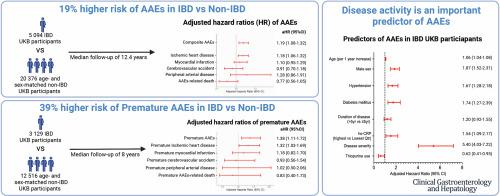Clinical Gastroenterology and Hepatology ( IF 11.6 ) Pub Date : 2022-09-06 , DOI: 10.1016/j.cgh.2022.08.035 Quazim A Alayo 1 , Edward V Loftus 2 , Andres Yarur 3 , David Alvarado 1 , Matthew A Ciorba 1 , Lisa de Las Fuentes 4 , Parakkal Deepak 1

|
Background & Aims
Population-based studies have suggested an increased risk of acute arterial events (AAEs) in patients with inflammatory bowel disease (IBD). We aimed to assess the risk of incident AAEs and premature AAEs, adjusted for diet, physical activity, and inflammation biomarkers, in participants with IBD in the UK Biobank (UKB)
Methods
UKB participants with IBD and without prevalent AAEs at enrollment were matched to random non-IBD controls. A Cox regression model, adjusting for baseline cardiovascular and IBD risk factors, diet, physical activity, and high-sensitivity C-reactive protein, estimated adjusted hazard ratios (aHRs) for association between IBD and AAEs or premature AAEs (age, <55 years for men and <65 years for women). Predictors of AAEs within the IBD cohort were identified in a Cox model adjusting for disease severity (IBD-related hospitalizations or surgeries).
Results
Among 455,950 UKB participants, 5094 with IBD were matched to 20,376 non-IBD controls. After a median follow-up period of 12.4 years, participants with IBD had a higher incident rate of AAE (924.1 vs 730.9 per 100,000 person years; P < .001), risk of all AAEs (aHR, 1.19; 95% CI, 1.08–1.31; P < .001), and premature AAEs (aHR, 1.38; 95% CI, 1.11–1.72; P = .001). High-sensitivity C-reactive protein levels (highest quartile: aHR, 1.53; 95% CI, 1.15–2.03) and disease severity (aHR, 5.40; 95% CI, 4.03–7.22) were independent predictors of AAE in IBD.
Conclusions
In a prospective cohort, there was an increased risk of incident AAEs and premature AAEs in IBD participants. Beyond traditional AAE risk factors, quantifiable indices of IBD disease activity and severity were independent predictors of AAEs.
中文翻译:

炎症性肠病与急性动脉事件风险增加相关:英国生物库分析
背景与目标
基于人群的研究表明,炎症性肠病 (IBD) 患者发生急性动脉事件 (AAE) 的风险增加。我们的目的是评估英国生物银行 (UKB) 的 IBD 参与者发生 AAE 事件和过早发生 AAE 的风险,并根据饮食、体力活动和炎症生物标志物进行调整。
方法
患有 IBD 但在入组时没有流行 AAE 的 UKB 参与者与随机的非 IBD 对照相匹配。 Cox 回归模型,调整基线心血管和 IBD 危险因素、饮食、体力活动和高敏 C 反应蛋白,估计 IBD 与 AAE 或早产 AAE(年龄 <55 岁)之间关联的调整后风险比 (aHR)男性和 65 岁以下女性)。在根据疾病严重程度(IBD 相关住院或手术)进行调整的 Cox 模型中确定了 IBD 队列中 AAE 的预测因子。
结果
在 455,950 名 UKB 参与者中,5094 名 IBD 患者与 20,376 名非 IBD 对照者进行匹配。中位随访期为 12.4 年后,IBD 参与者的 AAE 发生率较高(每 10 万人年 924.1 例 vs 730.9 例; P < .001),所有 AAE 的风险(aHR,1.19;95% CI,1.08) –1.31; P < .001)和过早 AAE(aHR,1.38;95% CI,1.11–1.72; P = .001)。高敏 C 反应蛋白水平(最高四分位:aHR,1.53;95% CI,1.15-2.03)和疾病严重程度(aHR,5.40;95% CI,4.03-7.22)是 IBD 中 AAE 的独立预测因子。
结论
在一项前瞻性队列中,IBD 参与者发生 AAE 和过早发生 AAE 的风险增加。除了传统的 AAE 危险因素之外,IBD 疾病活动性和严重程度的量化指数是 AAE 的独立预测因子。









































 京公网安备 11010802027423号
京公网安备 11010802027423号